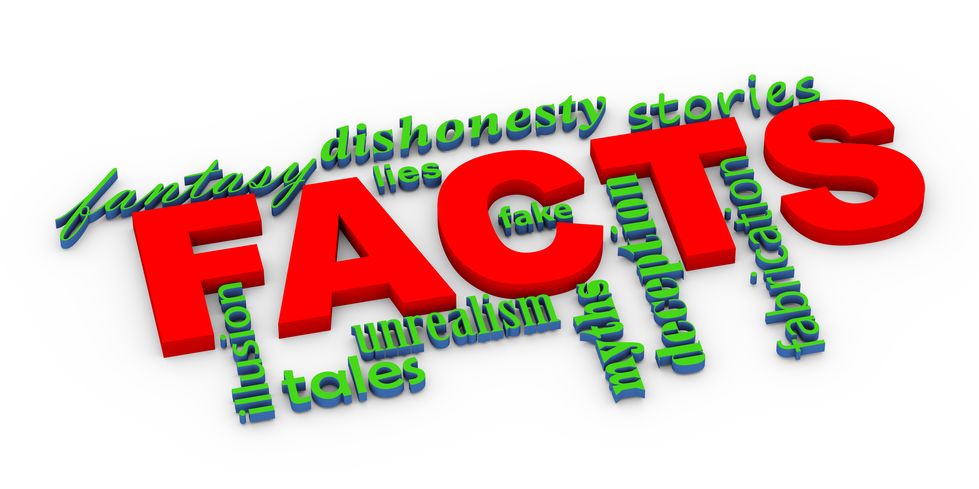Let’s say you’re scrolling your Instagram feed, and an ad for a fabulous-looking brand of shoes made from beautiful, butter-soft Italian leather pops up. You impulsively click and purchase, they arrive, and you discover they are actually made of cheap, already-starting-to-peel plastic. You’re going to be rightfully disappointed and put off, yes? You might even resist ever purchasing something in this way ever again. How could this happen? Aren’t there laws about these kinds of things? Well yes, yes there are.
Ahem (assumes serious demeanor)…From the Federal Trade Commission website, in the section entitled “Truth in Advertising”:
“When consumers see or hear an advertisement, whether it’s on the Internet, radio or television, or anywhere else, federal law says that ad must be truthful, not misleading, and, when appropriate, backed by scientific evidence.”
Gee, Sara, what an enticing opening you have going here. No, I’m not preaching the importance of fact-checking that ad from your favorite organizing supply store (although you know I always wonder about the connection between buying tons of plastic bins and creating actual life order). Having confidence, clarity, and perhaps a dose of healthy skepticism that what you purchase matches what you are led to expect is part of the process.
But I’ve been noticing lately that sometimes we tell ourselves some whoppers about our organizing and productivity adventures. We might need a dose of truth in organizing to get back to the clarity and confidence needed to create our systems and ease the overwhelm. The stories we make up can totally go either direction – from minimizing the effect of over-scheduling:
“Sure, Steve, it’s not a big deal to handle the office party – all I have to do is make a few calls, create a Costco list, stop on my way into work on Friday morning, and voila!! – celebratory break room bliss achieved! Easy-peasy.”
To maximizing the effort of clearing out a pantry:
“Oh my GOSH, I’ll have to pull EVERYTHING OUT, and then it’ll take me HOURS AND HOURS to go through all of the cans and boxes, and then I’ll have to wipe everything down…maybe even vacuum, and I won’t be able to GET IT ALL BACK PERFECTLY because there’s SO MUCH, and there’s NO GOOD LIGHT IN THERE, and it feels SO hard, so why even start?” (excuse the all caps, I couldn’t help channeling a little Owen Meany* there).
These kinds of stories are examples of cognitive distortions – habitual errors in thinking – which researchers believe may have evolved as a method of coping with difficult life events, a way to manage and adapt to stress. But they can cloud the clarity needed to make informed decisions, misleading the teller of the story into something they weren’t bargaining for – causing them to “buy into” a narrative that doesn’t match reality.
What’s actually true about the situation or challenge you face? What can you verify, and how could you go about some fact-checking? If you had perused a few online reviews of those pleather shoes, you just might have saved yourself some money and trouble. So if you caught yourself for a moment or two before agreeing to that party, took a look at the bigger picture, and did a little backward and forwards analysis, what would you discover? You might eventually come to something like:
“…Okay, I guess when I stop to think about it, to get that party pulled off I’d have to of course start with my list, like I said. But then I’d need to leave super early on Friday morning. That means I would have to get the kids out to the bus stop instead of driving them in, which means I have to get their lunches ready the night before. And, oh shoot, I forgot Costco won’t even be open until 10 am, so that whole plan is not going to work anyway…maybe there’s more to contend with here than I realized. I’ve misled myself into thinking this would be no big deal, but it’s actually going to eat up a fair amount of my brain and my day.”
And thus, if I were to create my own set of rules around this kind of thing, I might propose:
“When we hear ourselves talk, whether it’s in our heads, to our family, friends, a professional, or anywhere else, organizing principles suggest that talk must be truthful, not misleading, and, when appropriate, backed by verifiable evidence.”
Easier said than done, I know. But worth considering for your next life order challenge.
________________________________________________________
*Owen Meany, for the uninitiated, is the main character of John Irving’s A Prayer for Owen Meany, which, if you haven’t read I highly recommend you take along to the beach this summer. It’s the only novel that has ever caused me to both laugh (hard) out loud, and sob (also hard) uncontrollably.




This post is so timely, Sara. And the “no big deal” party example is what went “ding, ding” as I read it. Something (a request) came up recently, which involved hosting a large-ish party at our house. This is something (pre-pandemic) we frequently did without any hesitation. However, having the quiet of 2020 and NO parties, I’m not so excited to return to things quite yet. So instead of immediately saying, “Sure, let’s host,” I’m pausing to think it through and weigh the emotions, stress factors, and the impact on my energy and to-do list. I’m not sure yet what I’ll decide, but I am allowing a day or two to think it through before jumping in. This will also allow me to create some boundaries around what saying “yes” could look like IF I go that route.
Thanks, Linda. I think what you’re describing is part of what inspired this post – many of us are wading back into more social activities, and the ensuing time and energy drains that those activities bring seem to lack some clarity (at least for me). It’s wonderful that you were able to pause before you make your decision – I need to follow your example on some similar things!
There is so much truth here, I’m not sure what to lean on first. Truth in advertising is probably a cousin to beauty is in the eyes of the beholder. We see and believe what we want to when we look at a photo an an advertisement. ( How dare that outfit not look as good on me as I planned out in my head?)
There are also a lot of truths in organizing that clients may not want to hear. Such as, this will be fast, 1-2-3.
Just like anyone else, I’ve been caught up in all of this myself. What I’ve learned to do (and I just got off the phone with someone who was trying to sell me) is to take a pause, a step back and reflect and then get back to the person or the advertisement.
I really love how you presented all of this!!
Thanks, Ronni – love the comparison to beauty being in the eyes of the beholder. Maybe it’s kind of like, truth is in the head of the worrier? 🙂
This is so good! Taking the time to really think about things instead of impulsively deciding is so important. Being mindful and analyzing what’s really true about what we think can take so much stress off of us.
Yes, even if understanding that what is really true is a little disheartening on the front end, at least it’s reality. Then we can relax a bit and make decisions based upon that reality. Thanks for the comment, Katherine!
Oh, Sara, this is so much truth-telling! Somewhere between telling ourselves, “I can do ALL THE THINGS [in eleven minutes between other things]” and “THERE’S SO MUCH so I’m not going to try at all” is the sweet spot belief system. I think this should be required reading before any of us, ever, agree to do anything other than join someone for ice cream.
I don’t know…ice cream can get me into all kinds of trouble. 🙂 Thanks for the comment, Julie!
Sara, I’m chiming in with the others, I loved this. In particular, I always like reading the way you express your thoughts. It’s as if I can hear you talking to me. It is an engaging conversation. I have lots to say on the topic of advertising and self-talk; more than I want to launch into here. Weighing pros and cons, taking a step back, and thinking with an open mind are the keys here – for me. I’m going to get the John Irving book.
Thanks so much, Diane. I hope you’ll let me know what you think of the book!
Wow! This really nails it on both ends of the scale. I recently agreed to host a simple luncheon which for me is usually so easy – but I knew that with one of the attendees having so many issues of what she could and could not eat this would not be a simple task. The pantry scenario sounds like so many of my clients! Thanks for sharing.